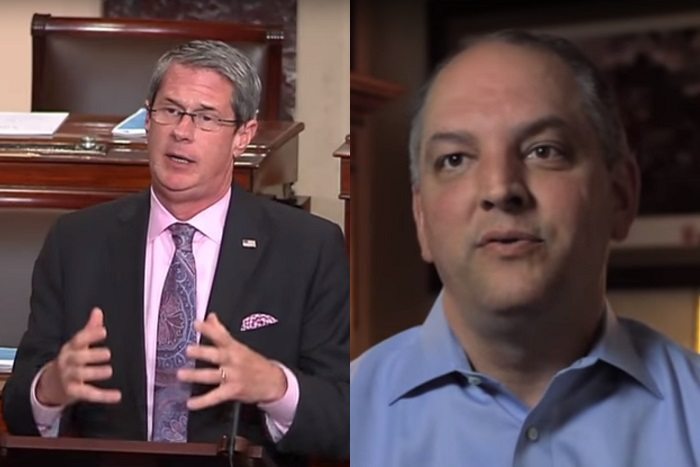Louisiana’s Race to the Bottom: State Gubernatorial Candidates Both Oppose Abortion
Louisiana's highly anticipated gubernatorial runoff election is making waves as a Democrat in the Deep South threatens Republicans’ hold on the governor’s seat. But whatever his politics, should he win, Rep. Edwards would still be no friend to reproductive health in the state.

Louisiana’s highly anticipated gubernatorial runoff election is making waves as a Democrat in the Deep South, Rep. John Bel Edwards, threatens a Republican’s hold on the seat. Much ado has been made about the possibility of a more liberal candidate taking over the office. But whatever his politics, should he win, Rep. Edwards would still be no friend to reproductive health in the state.
In the October gubernatorial election, neither Edwards nor his Republican rival, Sen. David Vitter, were able to capture the necessary 50 percent of votes it takes to win in the state, prompting a general election runoff slated for November 21. Vitter, once considered a shoo-in for the position after leading a May Southern Media & Opinion Research poll by more than 38 points, is now trailing 22 points behind Edwards, according to a recent University of New Orleans poll.
As part of a seemingly last-ditch attempt to regain ground, the Republican candidate has ramped up efforts to highlight his own extremism on abortion and contrast it with his opponent’s. Speaking at Jefferson Baptist Church in Baton Rouge last Thursday, Vitter condemned Edwards for supposedly refusing to defund Planned Parenthood. “Make no mistake about it. Planned Parenthood is an abortion mill,” Vitter said.
Vitter’s assertion that Edwards had opposed efforts to defund Planned Parenthood dismissed the Democratic candidate’s potential plan to do just that. Prior to the runoff, during an October gubernatorial debate that Vitter did not attend, Edwards outlined his support for investigating and possibly defunding Planned Parenthood clinics in the state—none of which currently provide abortion services—in response to the deceptively edited series of undercover video tapes released by the anti-choice front group Center for Medical Progress. Although Edwards also stated that funding shouldn’t be pulled until after another solution is found to deal with the patients who would lose access to care, the future could still be uncertain for the 5,200 patients eligible for Medicaid services who, according to the Times-Picayune, currently use Planned Parenthood of New Orleans and Baton Rouge for “cervical cancer screenings, sexually transmitted infection screenings and contraception.”
Even before the runoff, however, candidates across the aisle were touting their anti-choice credentials. The previously crowded gubernatorial field included two additional Republican candidates whose extreme positions on reproductive health were also a talking point on the campaign trail, and Vitter himself noted on social media that he was “honored” to receive an endorsement from the anti-choice National Right to Life Committee.
But it wasn’t just Republicans pushing their extreme positions on reproductive health; Edwards has also made his opposition to abortion access a key component of his campaign. In a 30-second television ad, Edwards’ wife appeared to discuss how doctors had advised her to terminate her pregnancy when tests revealed their daughter would have spina bifida, and how the couple decided to go through with the pregnancy anyway. Edwards credited his daughter with coming up with the idea for the ad, explaining that it was meant “to make sure people understood where we are on that issue as it relates to our Catholic Christian faith, being pro-life,” as reported by the Advertiser.
Overall, despite criticism launched by his more conservative opponent, Edwards’ record on abortion speaks for itself. According to Louisiana Right to Life (LARTL), the candidate received a 100 percent rating from the group based off a scorecard he filled out asking questions such as “Do you support the reversal of Roe v. Wade,” and, presumably referring to the Hyde Amendment, “Would you veto a law that would weaken existing law that prohibits the use of federal funds or state funds, facilities, employees, from performing, referring for, recommending, or counseling for abortions?” Edwards’ voting history while in the Louisiana House of Representatives between 2008 and 2015 also earned him a “100% Pro-Life” rating according to LARTL records, finding that he sided with the group in 28 out of 28 anti-choice votes.
One thing is clear: No matter which party wins the election, an anti-choice governor will remain in Louisiana, where the reproductive health-care situation is already dire. According to anti-choice organization Americans United for Life, Louisiana is the most hostile state to abortion rights in the country. Under Republican presidential candidate Bobby Jindal’s governorship and a GOP-led legislature, Louisiana has pushed through almost every effort to regulate abortion services out of existence within its borders. Extreme laws in the state include mandated state-directed counseling and an accompanying 24-hour waiting period prior to obtaining an abortion, telemedicine bans, required parental notification for those under 18, forced ultrasounds, and an outright ban on abortion procedures should Roe v. Wade ever be overturned.
These measures meant that there were just five abortion providers left in the state in 2011, leaving people in 92 percent of counties in Louisiana without access to an abortion provider.
Despite the state’s efforts to roll back access to care, the need for reproductive health services in the state is evident. According to a 2010 analysis from the Guttmacher Institute, 60 percent of all pregnancies in the state were unplanned, and almost 80 percent of the resulting births were publicly funded. About 45,000 women in the state relied on publicly funded family planning services for care in 2013.
It would seem that no matter who wins Saturday’s runoff elections, the real losers in the race will be the residents of Louisiana who won’t be able to access the reproductive health care they need.
